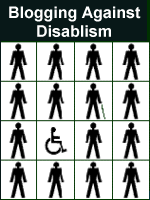This choice that is being forced upon me is impossible. I must either tolerate physical pain at the hockey arena or emotional abuse at the dojo, if I want to be a part of my child’s life. It’s ironic that disabled mothers are often viewed as incompetent but where is the discourse surrounding the ways in which our parenting often occurs under extremely difficult situations? I suppose, of all the people on the planet that Destruction and his brother Mayhem provide the best reason for me to want to rise above, but the constant pain requires more of a super human effort than I believe that I am capable of.
Murphy’s Law And Disability: The Week From Hell
Normally, we get by. We get by pretty well. Provided we stick with the diet restrictions, usually we just switch off when one is a bit more able to get things done than the other. Chores basically go to whomever is in less pain at the time, or in less of a bad mental state or who can actually do them reliably without issue (like me defocusing and being unable to even read a recipe because I can’t keep on it). Usually even when the chronic shit we deal with is flaring the other one is just dealing with the baseline of the chronic shit for them, and the other disabilities coming up are all spread out over time.
Not this week though.
This week was the perfect storm of flare ups, semi chronic appearances and stress induced aggravations of all of the various things we deal with on a regular basis. While my partner fought off a pain flare, struggling just to walk, I was nailed with a “Richter 7? migraine.
Accessibility and Gaming: Randomizers
Most traditional six-sided dice may be tactile enough that someone who can’t see could feel the result. There are also special “Braille dice” available for not that much more than premium gaming dice; they’re more properly called tactile dice since the faces are traditional die pips and not true Braille numbers.
So, blind players can probably get their hands on accessible d6s, but to the best of my knowledge there are no tactile dice made for any other types of dice. Champions, anyone?
I don’t know who dreamed up the concept of “disability simulations” but they have been around for a mighty long time. My lifelong friend, Michael A. Winter, now the Director of Civil Rights for the U.S. Department of Transportation, first exposed me to the shameful practice. Michael and I were classmates at a segregated school for crips and met in 6th grade. We attended the same university. As undergrads, Michael formed a group called Wheelchair Action. When the Rehabilitation Institute at Southern Illinois University sponsored a disability simulation, Michael and members of his group stormed into the classroom and tried in vain to halt the fiasco.
Professionals who are nondisabled rarely stop to listen to the people who live with disabilities. I was proud of Michael for trying to get people to understand how destructive these simulations can be.
Dean Tom Marrie is interested in hearing what kinds of qualities people value most in their family physician or specialist. What do you appreciate about your doctor? What do you think physicians of the future will need that might not be taught at med school today?
